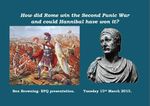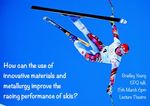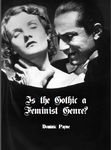Extended Project Qualification Presentation Evening - The ...
←
→
Page content transcription
If your browser does not render page correctly, please read the page content below
Extended Project Qualification
Presentation Evening
Tuesday 15th & Thursday 17th March 2016
Lecture Theatre 6.00 pm start.
Welcome to the sixth Perse School EPQ Presentation Evening.
The EPQ is a very different qualification from other AS subjects (and indeed A levels) in that there is no
specification to be followed. Each student chooses a topic area to research and then manages his or her own
progress from outset to completion. Students are required to formulate a suitable title, undertake extensive
research, and write a report of up to 5,000 words. In some cases an artefact or performance may be produced,
accompanied by a report.
Students are also required to keep a detailed log of the research and writing process, and to make use
of expert help in their subject area, in many cases going beyond School to do so. They are also assessed on their
ability to present their research verbally to a live audience and answer questions from the audience on it: you
are invited to pose suitable questions this evening as part of that process. Finally, the students have to write a
critical reflection on their research. All this means that the EPQ develops and tests a range of academic and
other valuable skills that go way beyond those required for most AS and A levels.
The range of projects is diverse and ambitious, and a list of titles, abstracts and posters follow. We have
had a very enjoyable year helping the students through the process, and hope you enjoy this evening of
presentations. If you are currently a lower sixth student you may well consider taking the EPQ next year and if
you are taking the HPQ we look forward to seeing you in the near future.
There is a poster presentation of each project around the stage area in the lecture theatre for you to
preview before the evening begins, during break, and after the presentations have ended.
D J Clarke EPQ Coordinator
CN Anderson, CA Deadman, S Dickens, MJ Fox & PJC Hicks, EPQ project supervisors.EPQ Programme
Tuesday 15th March
6.00 Tristan Alphey: To what extent was ‘chivalry’ a reality, rather than merely an
ideological phenomenon, in Western Europe during the
medieval period?
6.20 Millie Kearton: The war the Spanish have tried to forget: Why is the memory of
the Spanish civil war still so contentious?
6.40 Ben Browning: How did Hannibal lose the Second Punic War and could
Carthage have won it?
7.00 Break
7.15 Bradley Young: How can the use of innovative materials and metallurgy
improve the racing performance of skis?
7.35 Tom Anderson: What are the likely effects of climate change on the polar jet
stream?
7.55 Adam Hughes: To what extent should ethics be considered in the genetic
engineering of GM crops.
Thursday 17th March
6.00 John Busher: To what extent was Luddism a political protest?
6.20: Jia Gu: Suspended animation: science fiction or near reality?
6.40 Amy McCarthy: To what extent do websites which give information and advice
regarding medical issues benefit the General Practice system?
7.00 Break
7.15 Marcus Tuchel: What is the best battery technology for the future of electric
cars?
7.35 Dominic Payne: Is the gothic a feminist genre?Tuesday 6.00 Tristan Alphey To what extent was ‘chivalry’ a reality, rather than merely an ideological phenomenon, in Western Europe during the medieval period? ‘Chivalry’, as a concept, is one often misapplied in a modern world. This project explores the realities of early Medieval European chivalry, casting aside our romanticised remembrance, while highlighting the role of literature and idealisation in perverting its image. By highlighting three traditional pinnacles of chivalry (Richard I, Roland, and William Marshall), and by cross referencing such men to the actual delineations of the contemporary ideology, a degree of actual subscription to ‘chivalry’ may be deemed. Ultimately, such is a question as to whether ‘chivalry’ can ever be deemed to extend beyond the realms of an idealised way of thought, to an applicable regulatory body. Tuesday 6.20 Millie Kearton The war the Spanish have tried to forget: why is the memory of the Spanish civil war still so contentious? Franco, unlike other European dictators of the 20th century, was on the winning side of the Spanish Civil War; there was no pressure for Spain to ‘demonise him’ or to convict his supporters of war crimes. Nationalist heroes were remembered in the vast Valley of the Fallen whereas the Republican dead were denied any memorial at all. Following Franco’s death in 1975, the leading political parties signed ‘The Pact of Forgetting’ which allowed Spain to move on from the violence of the past and make a swift transition into democracy. However, many today feel that in order to achieve this peace, justice had to be sacrificed, and now it is important for the future stability of the country for this legacy to be addressed. Others disagree, fearing that the process of remembering could re-open old wounds. This project will examine why the memory of the Civil War is still so contentious both in Spain and abroad. It will touch on the horrors of the war which tore an already divided country apart, the repression of Franco’s rule, and the impact of the Pact of Forgetting on today’s politics. In the words of the novelist Cercas, “This is the past that has not passed. The civil war is still here.” Tuesday 6.40 Ben Browning How did Hannibal lose the Second Punic War and could Carthage have won it? This project evaluates the main causes for Carthage’s failure to win the Second Punic War against Rome, focusing specifically upon the war in Italy as well as evaluating the effectiveness of Hannibal’s, and indeed Carthage’s, overarching military strategy. Through the use of a combination of both contemporary and more modern sources I will seek to explain how a General that remained undefeated in set piece battle for fifteen years finished a member of the defeated side, and without straying too far into counterfactual history I will seek to answer whether there was anything more that could have been done to attain victory, or whether the clear contrasts in culture between the nations made this result almost inevitable.
Tuesday 7.15 Bradley Young How can the use of innovative materials and metallurgy improve the racing performance of skis? With races won or lost over hundredths of seconds, ‘marginal gains’ is an important topic within ski racing. With such in mind, this project explores the different aspects of the ski to decide which area would be most beneficial to develop for the racing skier. Once such aspects have been identified the project explores the ways in which innovative materials science and metallurgy could be used to enhance the performance of this area of design within the ski. With almost all sports having moved away from the use of wood in their equipment in favour of more modern composites, is this ancient material still the most effective for the skiing industry? Tuesday 7.35 Tom Anderson What are the likely effects of climate change on the polar jet stream? Jet streams are high speed currents of winds that many of us hear about regularly through weather forecasts. They affect our lives on a daily basis through a number of means: transatlantic flights for instance can “hitch a ride” on the jet, cutting down the time it takes to fly from New York to London by up to two hours. However, the complex processes and forces that go on behind the scenes are less well understood, and the aim of this project is to explain some of the implications climate change (specifically, rapid warming at the poles) will have on these unique forces of nature in the future. Tuesday 7.55 Adam Hughes To what extent should ethics be considered in the genetic engineering of GM crops. The regulation of genetically modified crops differs from country to country around the world. The aim of this project is to highlight differences in regulation in order to understand positions held by some countries over the controversial topic of these plants, their real uses and what they represent.
Thursday 6.00 John Busher To what extent was Luddism a political protest? The cause of the Luddites, people who in the years 1811 to 1817 embarked on a concerted campaign of machine breaking in the teeth of Britain’s nascent industrial revolution, has today become synonymous with a philosophy that criticises unconstrained technological progress. However, the actual aims and motivations of these figures were, in fact, considerably more diverse. The government, for example, treated the disturbances as a serious threat to its power and was forced to divert significant numbers of troops from the Napoleonic Wars to crush the unrest. What little survives of Luddite writings, meanwhile, displays a wide variety of political, economic and social opinions and goals, leading to doubts about the exact nature and intention of the revolts. Through analysis of primary and secondary documents, alongside communicating with respected authorities on the subject, I have attempted to establish the extent to which Luddism was a revolutionary movement as well as an economic one. This question is of the highest contemporary importance as, depending on the answer, the period 1811-1812 may have been the closest Britain has ever come to a genuine popular revolution. Thursday 6.20 Jia Gu Suspended animation: science fiction or near reality? Science fiction writers have always been captivated by the concept of suspended animation - preserving humans in a reversible state between life and death. In fictional stories, one can simply be put to “sleep” with the flick of a switch, going through millenniums of interstellar travel only to be woken up unaffected by the passing of time. For decades, the idea seemed to be far-fetched in the scientific world. In my presentation, I will discuss the current research into pausing the biological clock in order to buy time for the critically injured or for other medical reasons. Other terms such as cryptobiosis, hibernation and quiescene torpor all represent varying degrees of suspended animation which is often characterized by both reduction of energy production and lowering of cellular metabolism. Humans can’t control their biological clock any more than they can stop breathing without causing severe hypoxic damage. However, with recent research, a way to forcibly induce suspended animation may have been discovered using a gas that was essential for survival 55 million years ago. If the method is proven viable, then science fiction might just become a little closer to becoming reality. Thursday 6.40 Amy McCarthy To what extent do websites which give information and advice regarding medical issues benefit the General Practice system? During the process of applying to medical school, I undertook many clinical work experience placements. Throughout these periods I became aware that patients were frequently researching health concerns online. The purpose of this project was to determine the extent that internet research into medical issues is beneficial, with a specific focus on its effects to the general practice system. I conducted a survey to investigate which websites people visited for medical advice and crucially why they choose to use them. NHS direct and Web MD were by far the most popular sites and the majority of people used them to increase awareness of symptoms or to diagnose a condition.
Existing literature highlighted that much of the information available online is unreliable, however more than half the people surveyed said they trusted the information they found online. A focus group reinforced that internet sites are most often used to check symptoms and diagnose conditions but interestingly most of the participants would research online in conjunction with consulting a health care professional. Interviewed GP’s all said that patient research was common prior to a consultation. Furthermore, providing patients are willing to accept when their information is incorrect, health research by patients is helpful as it results in a more informed and receptive patient. Additionally the GP’s said they would recommend internet research to patients in specific cases. Thursday 7.15 Marcus Tuchel What is the best battery technology for the future of electric cars? Electric cars are the future. They have better efficiency, are more reliable, have faster acceleration and decreased running costs when compared to conventional petrol car. However, they only account for 0.001% of all road cars. Why is this? Research shows that the main reason for this is clear: it is the batteries used as they contribute to the cost and range of the car which, from my survey, I found to be the top two considerations taken into account when buying an electric car. For my project I am comparing three energy storage methods to find which technology is the most promising to be able to increase the range of electric cars and also lower the price so that in the future electric cars will be the majority of cars on the road. My research revealed that there were two ways in which the effectiveness of batteries can be compared and contrasted. These were ‘technological fact’s’ and ‘what consumers want’. In researching technologies, I contacted Andrew Morris, a researcher at the University of Cambridge. Through conversations with him I drew conclusions about the three very different forms of battery being used: Lithium air batteries, Lithium-Sulphur batteries and the ‘3d’ battery from the company Prieto. In relation to ‘what consumers want’, it is simply low cost and long range. From my research I concluded that all the technologies have their advantages and disadvantages but that the Lithium-Sulphur battery is the most promising as it is only a few years away from being a reality and is also half the price of current batteries. Thursday 7.35 Dominic Payne Is the gothic a feminist genre? This project examines the gothic genre, specifically the male gothic tradition, which has previously been viewed as sexist. Through the analysis of five texts spanning a century and a half, alongside feminist criticism, I will evaluate whether the texts support a feminist interpretation, or instead mirror the period’s repression of women. This project presents the idea that, through the depiction of the gothic heroine and her relationship with other characters, the genre empowers women to subvert the oppressive patriarchy, advocating social and cultural reform.
You can also read



























































